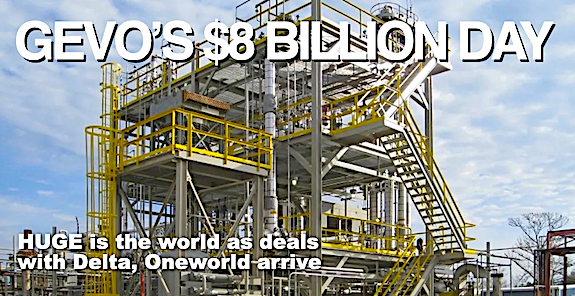Gevo’s $8 Billion Dollar Day

As the industry exits ABLC and returns to the day-to-day of transforming the world’s industrial base to a sustainable future, news arrives from Colorado that Gevo signed $8.1 billion in deals yesterday. Yes, one day.
The Delta deal: $2.8 billion
Gevo signed a “take-or-pay” agreement with Delta Air Lines to supply 75 million gallons of sustainable aviation fuel per year for seven years (the “Agreement”). The Agreement replaces the existing agreement signed with Delta in 2019 to purchase 10 million gallons per year and bolsters Delta’s commitment to incorporating SAF into its operations.
The projects and technology
Think Gevo’s Net Zero project at Lake Preston, South Dakota, voted #17 in the 50 Hottest Projects in the Bioeconomy last week.
Gevo’s sustainable aviation fuel is produced using inedible corn products that are processed to create ethanol that is then converted into sustainable aviation fuel. The sustainable aviation fuel is expected to be produced at three facilities under development in the Midwest of the United States.
Gevo’s production processes will incorporate renewable energy, including wind turbines, biogas, and combined heat and power systems (CHP) to increase efficiency and reduce carbon intensity to net-zero levels, which the customer can then pass on through the fuel.
Deal value
Based on current assumptions, including those around future pricing of commodities and the future values of certain environmental benefits, Gevo estimates that the Agreement will generate approximately $2.8B of revenue, inclusive of the value from environmental benefits, for Gevo over the seven-year term of the Agreement.
OneWorld deal: $5.33 billion
News also arrived today from our friends at Finnair that members of the oneworld Alliance plan to purchase up to 200 million gallons of sustainable aviation fuel per year from Gevo. Delivery of the fuel will commence from 2027, for a five year-term.
In November 2021, oneworld announced a joint commitment to purchase more than 350 million gallons of blended sustainable aviation fuel from Aemetis for operations at San Francisco and Finnair was among the members in this commitment.
oneworld is the first global airline alliance to jointly commit to purchasing sustainable aviation fuel, and the new commitment is the second of its kind. Finnair had earlier partnered with Neste in Finland to increase to use of SAF and hence reduce carbon emissions of flying.
The Bottom Line
Huge is the word. Huge deal, huge partners, huge implications for Gevo’s capacity expansion plan, huge knock-on impact for other technology providers — never has there been so much validation of SAF’s price and performance, never have so many airlines secured their 2020s SAF baseload supply in one day. Makes you wonder what tomorrow will bring.
Reaction from the stakeholders
“On behalf of the entire team at Gevo, I want to congratulate our partners at Delta for their leadership in continuously pushing the aviation industry towards net-zero emissions. Delta makes for a great customer, recognizing that big change is needed. I also appreciate their faith in what we are doing at Gevo. Net-zero jet fuels matter. We expect production from our first Net-Zero plant to begin in 2025. To meet the demand that we now have under contract, we need to develop and build more than one Net-Zero plant. This is a happy problem to have,” said Patrick R. Gruber, Ph.D., Gevo’s Chief Executive Officer.
“Net-Zero Fuels are made by using low-carbon feedstocks produced with climate-smart agricultural practices and by eliminating fossil-based energy from the business system as much as possible. In addition, our customers depend on us to count carbon at every step of the process,” said Paul D. Bloom, Ph.D., Gevo’s Chief Carbon Officer, and Chief Innovation Officer. Dr. Bloom continued, “By accurately accounting for carbon emissions using Argonne National Laboratories GREET model along with our Verity Tracking platform we will provide confidence to our customers like Delta that scientifically robust and transparent methods are used to meet and measure their sustainability goals. We want to create a win-win value proposition for every participant in the SAF supply chain by tracking all carbon intensity benefits in our SAF.”
“SAF is a critically important lever we have available today to help our industry reduce the lifecycle carbon emissions from aviation fuel,” said Kelly Nodzak, Delta’s Director of Global Jet Fuel Procurement. “That’s why we are working to develop the market and a broader understanding of the effectiveness of SAF, which can reduce lifecycle emissions up to 80 percent when used in pure form compared to fossil jet fuels.”
“With the right policies and incentives in place, we can unlock a future where sustainable aviation fuel is a viable climate solution that benefits air travel and beyond,” said Amelia DeLuca, Delta’s Vice President of Sustainability. “SAF production creates good-paying jobs in manufacturing, improves the environmental quality for all, and fosters rural economic opportunity for feedstocks and pathways. It will help us protect the planet we share and the places we call home.”
“The high price and limited availability of sustainable aviation fuels still present challenges for increasing its usage in commercial aviation, and thus stimulating demand and supply is important to drive down the price of SAF and to increase its availability – underlining the importance of joint commitments like that of oneworld member airlines,” says Eveliina Huurre, SVP Sustainability at Finnair.
Category: Top Stories















